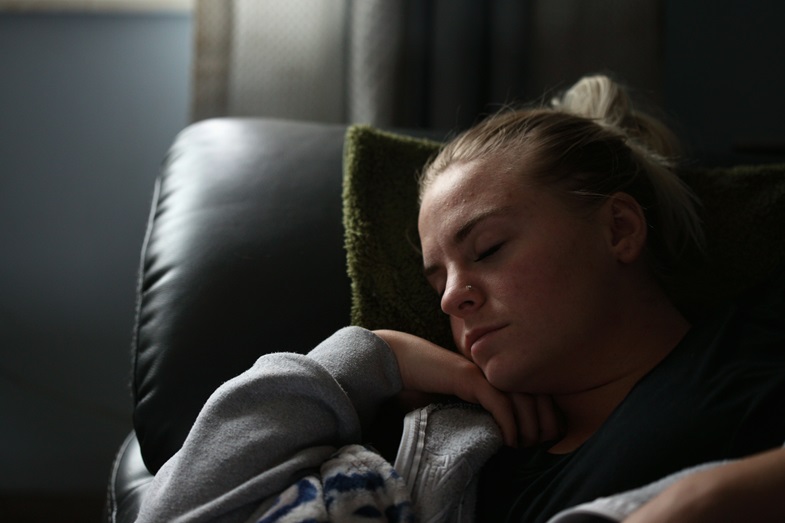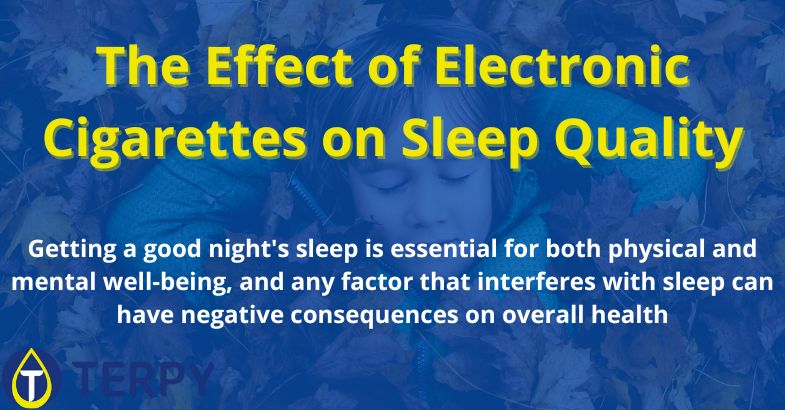Published on: 22/11/2024
Getting a good night’s sleep is essential for both physical and mental well-being, and any factor that interferes with sleep can have negative consequences on overall health
In this article, we will take a detailed look at how vaping can affect sleep, analyzing the key factors involved and considering the available scientific evidence.
The goal is to provide a comprehensive overview for those who use electronic cigarettes and want to better understand the potential effects their use may have on rest.
The Role of Nicotine and Its Effects on Sleep
To understand how electronic cigarettes affect sleep quality, it’s essential to consider their primary ingredient: nicotine. Although nicotine-free e-liquids exist, most users opt for products that contain this substance, often in varying concentrations.
Nicotine is a central nervous system stimulant with well-documented effects on wakefulness and attention. When inhaled, it triggers the release of adrenaline, increasing alertness and reducing feelings of fatigue. This is one of the main reasons why smokers often use cigarettes to stay awake and focused.
However, nicotine’s stimulating effects can become a problem when it comes to sleeping. Numerous studies have shown that nicotine negatively impacts the sleep cycle in several ways:
- Difficulties Falling Asleep: nicotine, like any stimulant, can prolong the time it takes to fall asleep. This is known as sleep latency, and an increase in latency is associated with a reduction in overall sleep quality.
- Reduction in Deep Sleep: nicotine can decrease the duration of slow-wave sleep (or deep sleep), one of the most restorative stages of the sleep cycle. Deep sleep is crucial for tissue repair, memory consolidation, and physical and mental regeneration.
- Increased Nighttime Awakenings: nicotine can lead to fragmented sleep, causing more frequent awakenings during the night. This may occur because, after a few hours from the last inhalation, nicotine levels in the blood begin to drop, leading to withdrawal symptoms that disturb sleep.
- Effects on Circadian Rhythm: nicotine can disrupt the circadian rhythm, the “internal biological clock” that regulates sleep-wake cycles. Specifically, its stimulating action can delay the production of melatonin, the hormone that signals the body that it’s time to sleep.
These effects, although already well-documented in the case of traditional smoking, can also be present with the use of electronic cigarettes, albeit with slightly different dynamics due to variations in nicotine levels consumed and the method of absorption.
Read also: How to Keep Your E-Cigarette Clean


Electronic Cigarettes and Insomnia: A Worrying Connection?
Many e-cigarette users report difficulties sleeping, often due to insomnia, which can manifest as trouble falling asleep or staying asleep throughout the night.
Several studies have attempted to understand whether there is a direct link between the use of electronic cigarettes and the onset of insomnia episodes.
One possible explanation is the previously mentioned presence of nicotine, which interferes with the body’s natural sleep mechanisms. However, some researchers argue that other factors, such as the act of vaping itself, may also have an impact.
- The Vaping Ritual Before Bed: many electronic cigarette users have the habit of vaping in the evening, sometimes immediately before going to bed. This can be problematic, as inhaling nicotine close to sleep increases brain stimulation levels, making it more difficult to relax and fall asleep.
- Psychological Aspects Related to E-Cig Use: the psychological component of vaping should not be underestimated, as it can trigger feelings of anxiety or concern, especially in new users. Anxiety is a significant factor that adversely affects sleep quality and can exacerbate issues for those already suffering from sleep disorders.
Electronic Cigarettes vs. Traditional Cigarettes: A Comparison of Sleep Effects
Another relevant question is whether electronic cigarettes have a lesser, equal, or greater impact on sleep quality compared to traditional cigarettes. Regular smokers often report sleep disturbances, but how do electronic cigarettes fit into this context?
On one hand, it has been shown that conventional cigarette smokers experience more sleep problems than non-smokers. This is due to a complex set of factors, including the stimulating effect of nicotine and the impact of inhaled toxic substances. Electronic cigarettes, on the other hand, lack many of the toxic compounds found in traditional cigarettes, such as carbon monoxide and tar, which are known to reduce sleep quality by altering lung capacity and cardiac function.
However, the nicotine present in electronic cigarettes remains a concern. A 2017 study conducted on a sample of adults demonstrated that those using electronic cigarettes had compromised sleep quality, although the disturbances were slightly less severe compared to traditional smokers. This suggests that while electronic cigarettes may represent a less harmful alternative in some respects, the benefits regarding sleep may not be as significant.
Other Components of Vaping Liquid and Their Potential Effects on Sleep
In addition to nicotine, e-liquids contain other ingredients, such as vegetable glycerin, propylene glycol, flavors, and, in some cases, additives like caffeine. Therefore, it’s important to consider the impact of these components on sleep quality.
- Flavors and Additives: while the flavors used in e-liquids are generally considered safe for food use, there is still no full understanding of how inhaling these substances may affect sleep. Some flavors, for instance, could have an irritating effect on the respiratory system, indirectly impacting sleep quality.
- Propylene Glycol and Vegetable Glycerin: these two compounds are the foundation of most e-liquids and are deemed safe for food and cosmetic use. However, some individuals may be sensitive to these substances, leading to respiratory irritation that can disrupt sleep, especially in the presence of pre-existing conditions like asthma.


The Importance of Moderation and Timing of Use
In light of the discussion, it is clear that it is important to consider not only the amount of e-cig used but also the times of day when vaping occurs. Reducing consumption in the evening or, better yet, avoiding vaping at least a couple of hours before bedtime can make a significant difference in sleep quality.
Additionally, for those who already suffer from sleep disorders, such as insomnia, it is advisable to monitor the use of electronic cigarettes and check for a connection between increased vaping and worsening symptoms. Gradually reducing consumption or using nicotine-free liquids for e-cigarette in the evening may represent a step toward better rest.
Read also: Electronic Cigarettes and Health: What Science Says
In Conclusion
The use of electronic cigarettes is a continuously expanding phenomenon, but as we have seen, their impact on sleep quality should not be underestimated. Nicotine, the main active ingredient, has significant effects on the ability to fall asleep and maintain regular sleep, interfering with normal sleep-wake cycles. Although electronic cigarettes represent a less harmful alternative compared to traditional cigarettes in many respects, sleep-related issues remain a concern. For all your e-cigarette needs you can visit our Terpy store.





